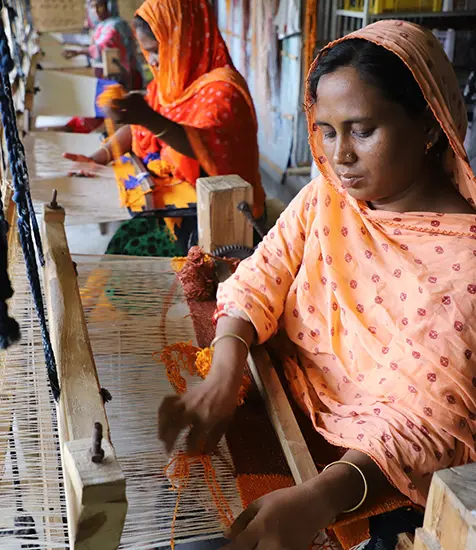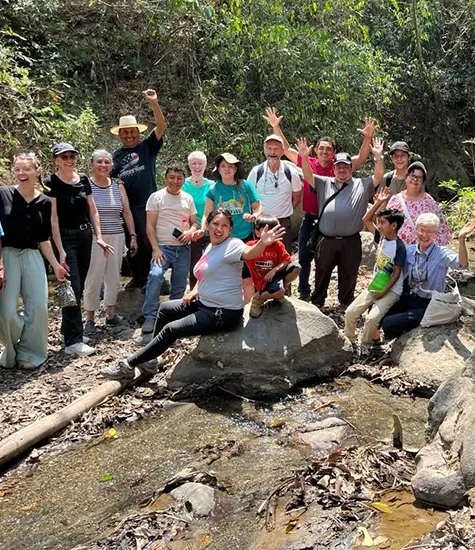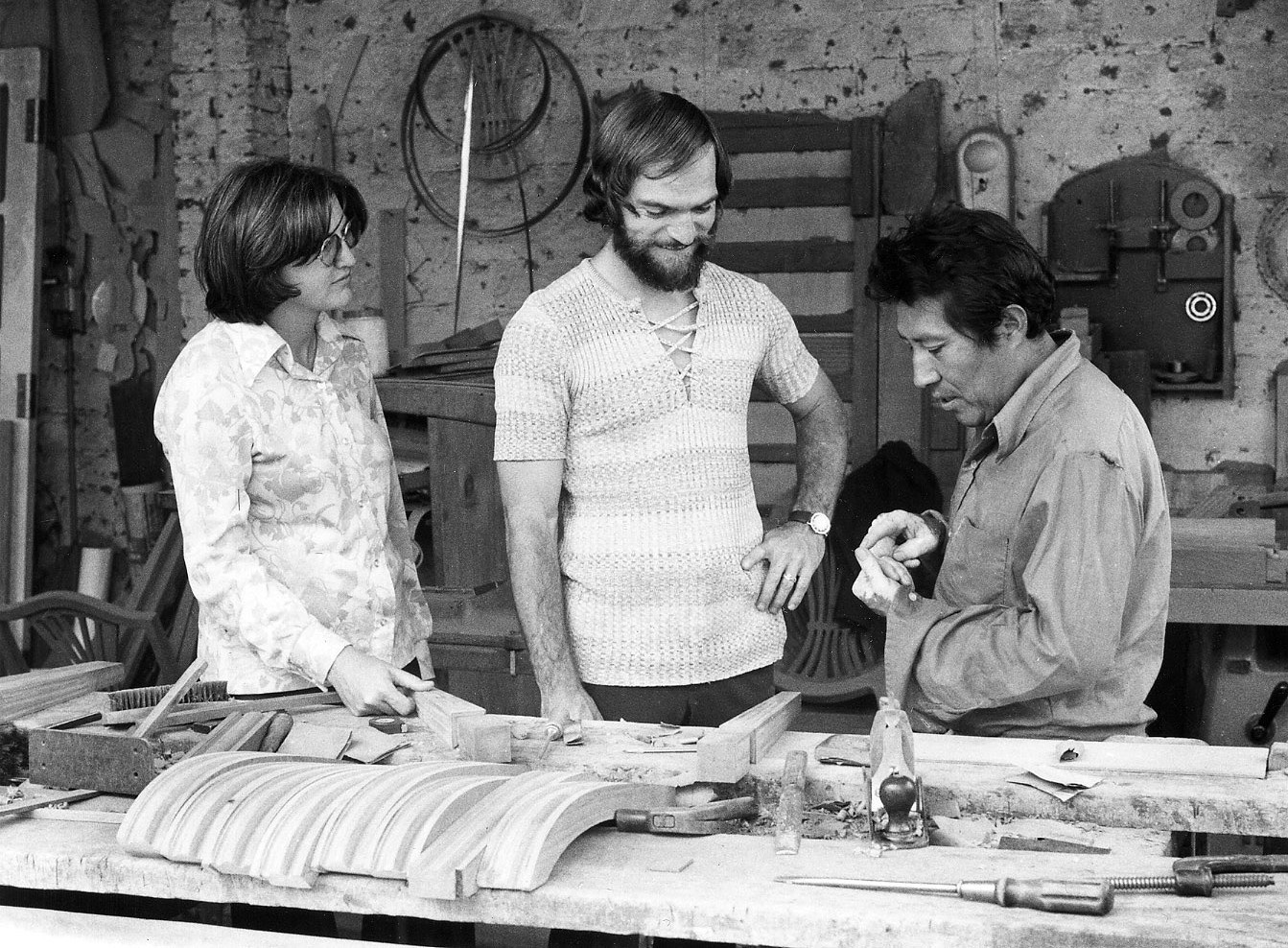
Josie and Frank Cuda in 1977, with a Cristo Rey parishioner in his workshop in Cochabamba, Bolivia (Maryknoll photo by Eric Wheater).
Both of us felt called to mission and ministry from an early age. We met while on a retreat team, became friends, and eventually married — hoping to share that call. In the early 70s there were not many opportunities to live such a vision. After being married, we began applying to various religious and secular institutions (40 in all) to see if we might be able to live out such a lifestyle as a married couple.
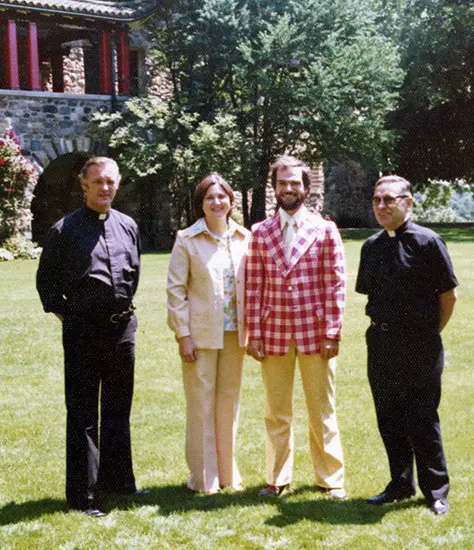
Josie and Frank Cuda, with Maryknoll Fathers Ray Hill and Bill O’Leary after their June 30, 1975 departure ceremony
Maryknoll began its official lay mission program on June 1, 1975, and, together with George Gieselman, we made up the first official orientation class and were part of Maryknoll’s first official “departure ceremony” of lay missioners on June 30, 1975. We had started our six-week orientation class in May; it included a mission institute at the Maryknoll Sisters.
Our assignment was to Cristo Rey Parish in Cochabamba, Bolivia. The parish served 40,000 people in more than 50 barrios. We were to work in the 12 public schools in the parish, updating the religious-education teachers who worked in the schools.
George, who was going to serve in Guatemala, and the two of us started attended language school together in Cochabamba. We lived with a local family during this time. Shortly after our arrival, a state of siege was declared. The tin miners went on strike, the students supported their demands, and the government shut down the school system for over a year. No groups of over three persons were allowed to gather after 9 p.m., and the penalty for defying the ban was to be shot on sight.
As missioners, we had expected to have to be creative, and we applied that to the situation. Our vision of our ministry was based on the belief that God was already present among the people we were to serve. Our role was to reflect that love back to them by supporting their efforts to be the best they could be — and thus deepening their belief in themselves and in God.
We worked with small faith groups of teachers, youth and other interested adults who wanted to see their community thrive. Various models such as the Christian Family Movement and comunidades de base (base communities) were offered by local groups, and we helped with the logistics and coordination of efforts.
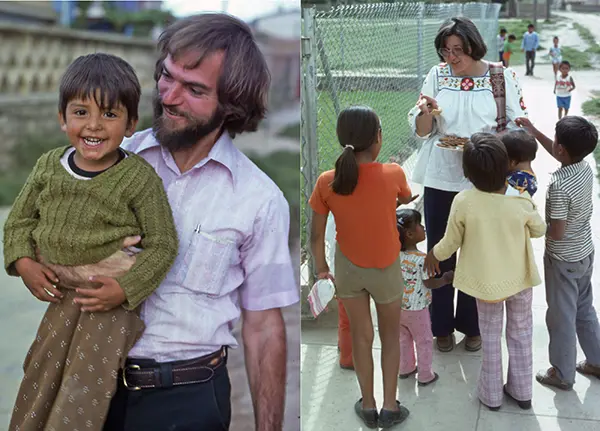
Frank and Josie Cuda, with neighborhood kids in Cochabamba (Maryknoll photos by Eric Wheater).
Since we only had one priest for this enormous parish, we went to our local Bolivian bishop for advice. He basically said he trusted our efforts, and we had his blessing to provide baptisms, Sunday services when no priest was available, burial of the dead and any other services that would enhance the work of the church.
We then organized a workshop for leaders from all the barrios and were able to have attendance from every barrio with the understanding that they would provide the local church leadership for their communities.
In 1978, as our three-year term was coming to a close, we helped recruit lay replacements for ourselves and were asked to come back to the Lay Missioner Office at Maryknoll, New York, to help with recruitment.
At that time, the Lay Missioner Office was receiving more than 400 inquiries a month from interested lay persons. We helped the office, and Josie also worked with the communication office. At the end of our next three-year term, we were blessed with twins. We could no longer work in high altitude with newborns and left the Maryknoll Lay Missioner Program for our next mission in Appalachia.
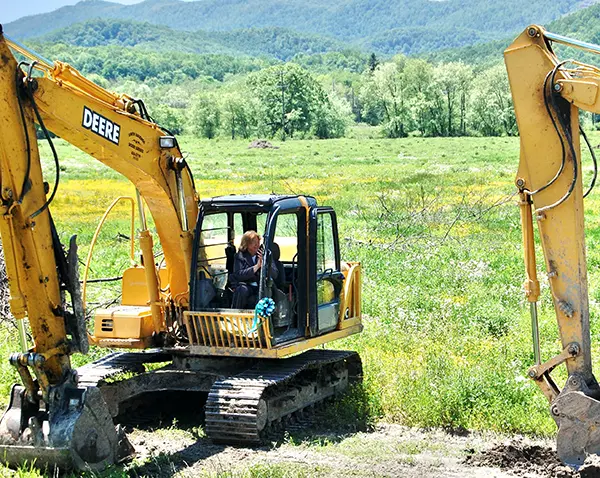
Josie in a digger at the groundbreaking for 20 new affordable homes in Elkins, West Virginia.
This aspect of our missionary calling had new challenges. We left behind an “official” Catholic role with all the support structure that entailed. In poor rural areas such as our Randolph County in West Virginia, there are few resources available and it takes time and patience to be accepted as a participating member of the community.
Fortunately, from our Maryknoll Bolivia experience, we had learned the art of being open to other cultures and values. We also had learned the absolutely essential necessity of having supportive people and communities to work with. We could then listen together with others to find the gaps that prevented communities from thriving. Over the next 40 years, we joined some groups and started others that would be necessary for supporting the rise of a healthier community.
During this time, we worked in healthcare, housing and disaster relief. We often found our skill sets challenged, but never lost sight of the overall goal of being a healing presence in our communities. Our faith in God’s love inspired us to take risks and move forward.
We initiated local small faith communities, worked with the Catholic Committee of Appalachia and worked on regional and national rural housing initiatives. We were able to help start two community-owned clinics, providing healthcare for those who needed it: Pendleton Community Care in Franklin and Valley Health Care in Mill Creek.
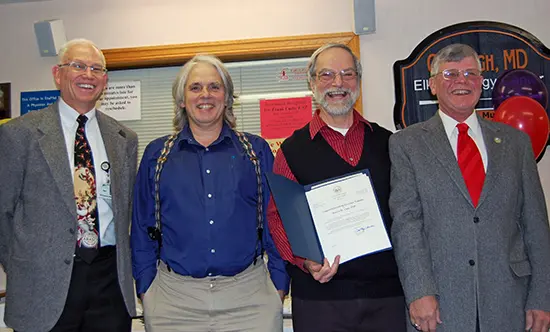
Frank (second from right) at his retirement, after serving for 35 years as a family nurse practitioner.
Frank worked as a family nurse practitioner for 35 years, eventually giving baby shots to the children of the children he had first immunized. Josie started a local branch of Catholic Charities, managed a program for challenged adults, and spent 16-plus years as CEO of a six-county housing authority. During this time, she developed Woodlands Development Group and several other nonprofits to support local and regional housing initiatives as well as a YouthBuild program, which provided at-risk youth with the opportunity to learn a trade, get their GED and learn the tools of leadership and responsibility.
During that time, we also consulted with Glenmary Home Missioners and helped them start their own lay missioner program.
When our sons were 15, we went back to Bolivia and also visited Peru. We visited the barrio the people had chosen for us to live in. Four of the youth from our barrio were working in service to their own people: One of our youth leaders, Gualberto, was now the head of 16 development projects funded by Germany; one was a lawyer working for womens’ rights in the prison system, and another one was a medical doctor. Another woman from our youth group, Consuelo, saw us walking down the street in Cochabamba, stopped the taxi she was in and ran up to us. She insisted we see her office where she produced health education programs in three languages, and then she made sure we would visit her home in our old barrio so her mother could see us as well.
At this stage in our life, we spend less time doing and more time reflecting and growing our spiritual life. Now in our late 70s, we continue the journey, always looking for healing opportunities, seeking new communities, “always missioners.”
Read ‘Building blocks’ in Bolivia, a Jan. 1978 Maryknoll magazine article about Frank and Mary “Josie” Cuda:
Read the Tribute to Mary “Josie” Cuda, entered into the Congressional Record by U.S. Sen. Shelley More Capito of West Virginia:



